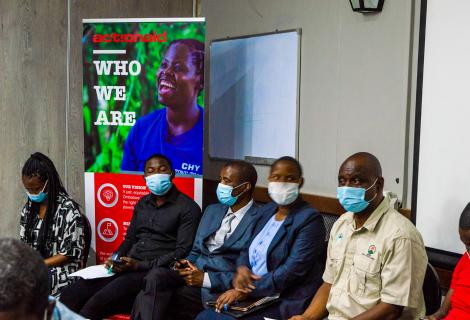Strategic Partnership Agreement 2 Launch: renewed attention to youth, women, and green solution

AAZ, supported by ActionAid Denmark and in partnership with three community-based organisations, namely Basilwizi Trust, Fambidzanayi Permaculture Centre and Green Governance Zimbabwe Trust, has launched a Strategic Partnership Agreement (SPA) 2 programme. It focuses on youth agency in influencing an enabling environment for the implementation of feminism and green economic alternatives. This is an action that will consequently improve youth’s livelihoods and resilience to climate change-induced shocks and stresses. This four-year programme is starting from 2022 and will be ending in 2025.
SPA 2 attention to green solutions stems from experiences in Southern Africa and Zimbabwe of disaster patterns of droughts, floods, epidemics, pandemics and cyclones, the bulk of which are climate change-induced which have occurred in recent years.
Building on the successes of SPA1 which focused on youth participation in leadership with a particular entry on the provision of gender-responsive public services, SPA2 will complement the work of local governments to support the districts of Binga, Chimanimani, Chipinge and Mbire. These districts considered fragile contexts as they experience the worst climate change effects and host a considerable number of internally displaced peoples (IDPs).
AAZ is proposing that the green solutions proposed in SPA2 should be scalable on a national level and thus bringing about change that involves youth. Ultimately this will enable the government to provide citizens access to public services, building a community resilient to shocks and that can enjoy sustainable livelihoods with youths being the priority.
Launching SPA 2 in the presence of government representatives in the climate and agriculture sectors, district development coordinators and Parliament Portfolio Committees for these sectors, Joy Mabenge, AAZ Country Director said: “Any programming focusing on increasing “meaningful” youth participation should focus on not only on facilitating for young people to be involved in these processes but rather should first target their most immediate needs such as their livelihoods after which they can meaningfully participate”.
He said women are the most exposed to the effects of climate change given their reliance on natural resources, a situation that creates food insecurity and social exclusion. Hence the need to target young women more in SPA 2.
ActionAid, through SPA2, is proposing green alternatives such as agroecology as mitigation measures and alternatives for smallholder farmers, youths included. AAZ is advocating the government to divert resources from fossil fuels, non-renewable and industrialised agriculture and move into green alternatives instead
In addition, there has been a lack of proactivity on preparedness and prevention by the country’s leadership seen through the absence of a National Disaster Management Policy, a gap that ActionAid is advocating decision-makers to address.
“Despite the fast-changing disaster patterns in Southern Africa and in Zimbabwe and the increasing number of people in need of humanitarian assistance every year since 2016, Zimbabwe is yet to have a functional National Disaster Management Policy,” said, Isaac Mpande, AAZ Humanitarian and Policy Manager during the SPA2 launch.
Furthermore, the existing Civil Protection Act, which anchors the disaster management and humanitarian interventions in Zimbabwe, is outdated and requires replacement, added Mpande.
The government of Zimbabwe is therefore being called to: “Systematically integrate disaster risk reduction efforts into legislation, policies, development plans and programmes to enable sustainable development and poverty reduction. It should invest more in disaster risk reduction which will translate into spending less on humanitarian response, recovery, and reconstruction because when disasters strike the impact will be mitigated.”